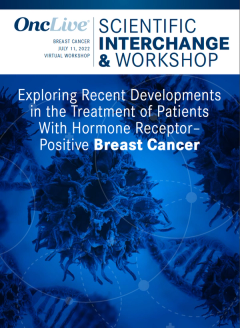
Dr. Graff on Initial Steps for Treating Metastatic HR-Positive Breast Cancer
Stephanie L. Graff, MD, discusses the initial steps for treating patients with metastatic hormone receptor–positive breast cancer.
Stephanie L. Graff, MD, director, Breast Oncology, Lifespan Cancer Institute, discusses the initial steps for treating patients with metastatic hormone receptor (HR)–positive breast cancer.
When evaluating a patient with breast cancer, the first step is to confirm a metastatic diagnosis with a biopsy and to use staining to determine estrogen receptor, progesterone receptor, and HER2 status, Graff says. Genetic testing, such as looking for PIK3CA mutations, can also be done initially, but establishing the histology of disease is key, Graff says. Tumors can be heterogenous and evolve over time, so confirming a patient’s status with testing in the metastatic setting is vital, since any change can significantly alter the direction of a treatment, Graff adds.
A patient’s site of a disease can also dictate palliative care. HR-positive metastatic breast cancer is associated with heavy bone metastases that could be at risk for fracture, Graff explains. This risk can be mitigated by involving radiation and surgical colleagues to potentially stabilize any effected bones, Graff continues. Palliative and supportive care colleagues can also support any symptoms or adverse effects that present during the disease, Graff concludes.








































